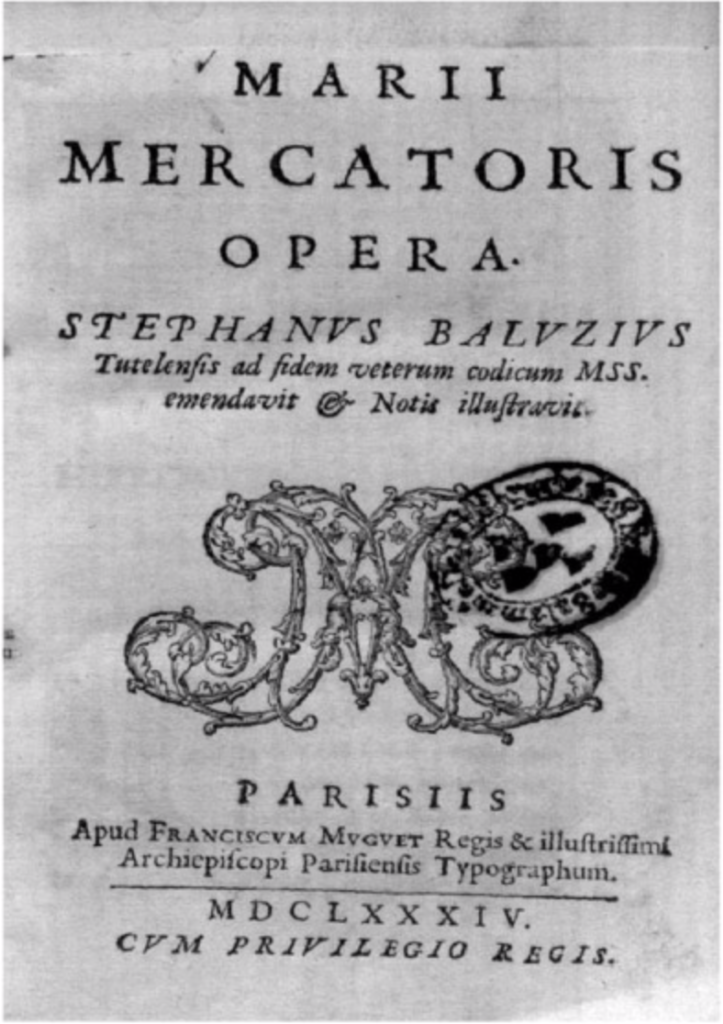Today, in our scholarly environment, we are used to certain ways of dealing with a topic and referencing everything, as for example the Chicago Handbook of Style, the APA or other accepted systems. But certainly this is not the only way to produce works that can be called academic, outside the closed system of “academic jargon.” There are very informative books in the form of dialogue, stories, and also in form of collection of excerpts from other works.
This last form was mostly used by Marius Mercator, a Christian writer of the 5th century. He was born in Africa but lived most of his time in Rome and Constantinople. He was in correspondence with Saint Augustine, to whom he donated some of his works. He died in 451. He was a layman. Among his most important works we remember Commentarium super nomina Coelestii, Comparatio dogmatum Pauli Samosateni et Nestorii, Nestorii blasphemiarum capitula.
William Bark wrote an article about Marius Mercator called The Doctrinal Interests of Marius Mercator (Church History, 12(3), 210-216. doi:10.2307/3160093). Here is an excerpt: “From the middle of the seventeenth until the end of the first quarter of the twentieth century Marius Mercator was regarded by theologians and historians as one of the most valuable extant sources of information concerning both the Pelagian and Nestorian controversies. The basis of the notable reputation which he so long enjoyed was of course the erroneous belief that he was the compiler of the Palatine Collection, a vast and impressive mass of papal and episcopal letters, remonstrances, sermons, confessions of faith, and memoirs used in the two ecumenical councils of the fifth century. This material concerned, almost exclusively, the heresies of Pelagius and Nestorius and apparently had been gathered together for use against the adherents of those two heresiarchs. Though little could be learned about Mercator himself, the available information gave him an impeccable position in the ranks of the orthodox. He was a disciple and correspondent of Augustine, whom he supported by savage attacks on Pelagius and other leaders of the Western heresy, and he was also known to Jerome, who, in a letter sent from distant Palestine to the Roman Donatus in the year 419, included a message to Mercator, encouraging him in his opposition to the Pelagians.”
We may be surprised to see how these writers focus on the dispute against heretics but this was really a burning issue of the time as it should be also today for us – heresies are appearing again and again in the life of the Church.
We mentioned about his relation with Saint Augustine. Giulio Malavasi and Anthony Dupont dealt with this relation in a paper called “Marius Mercator and the Augustinian Concept of Carnal Concupiscence” (Revue d’Etudes Augustiniennes et Patristiques 2018 64:1, 165-180). The thesis of the paper is as follows: “Marius Mercator was one of the less well-known theologians in the fifth century who reacted against the Pelagians. As such he wrote against the principal protagonists of the Pelagian movement: Pelagius, Caelestius, and Julian of Aeclanum. Because it was one of the most debated issues of the Pelagian controversy, the Augustinian concept of carnal concupiscence easily serves as a valuable litmus test for the sake of evaluating Marius Mercator’s loyalty to and understanding of Augustine’s own anti-Pelagian doctrine. A meticulous textual analysis of passages in which Mercator discusses carnal concupiscence shows that while he had a good knowledge of Augustine’s doctrine, at the same time, he often simplified and reduced the complexity of Augustine’s position.”
It was not easy to be active in a century when many heresies was shaking Christianity at its very foundation. But we should be also amazed at how God always produce antidotes to the many spiritual diseases that affect every century. We can be edified in knowing that God really does not abandon his loyal people, even in the midst of turmoil. G.K. Chesterton has said: “The true soldier fights not because he hates what is in front of him, but because he loves what is behind him.” Yes, behind the politically correct atmosphere that bothers us so much, we have to know that fight for the truth also benefits those who are doing wrong, because it helps them to see their mistakes. Yes, respect for the dignity of everyone, but higher respect for what is true over what is wrong. Truth has rights, error has not.


 Follow
Follow

